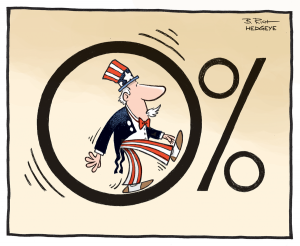Antonio Foglia writes: Everyone seems to be talking about – and condemning – today’s rising level of economic inequality. Fueled by jarring statistics like Oxfam’s recent revelation that the world’s richest 62 people own as much wealth as the poorest 3.6 billion, popular support for left-wing figures like America’s Bernie Sanders and Britain’s Jeremy Corbyn is rising.
Many of those engaged in the debate on inequality nowadays cite the French economist Thomas Piketty’s 2014 book Capital in the Twenty-First Century, which makes three key points. First, over the last 30 years, the ratio of wealth to income has steadily increased. Second, if the total return on wealth is higher than the growth in incomes, wealth is necessarily becoming increasingly concentrated. Third, this rising inequality must be reversed through confiscatory taxation before it destroys society.
The points might seem convincing at first glance.
From 1980 on, nominal interest rates fell dramatically. Not surprisingly, the value of wealth rose much faster than that of income during this period, because the value of the assets that comprise wealth amounts essentially to the net present value of their expected future cash flows, discounted at the current interest rate.
The most straightforward example is a government bond. But the value of a house is determined in a similar manner: according to the rent it is expected to generate, capitalized at the current nominal interest rate. Equities, too, are valued at a higher multiple of earnings when interest rates fall.
In determining the value of total wealth, Piketty included both the income generated by assets and their appreciation. Meanwhile, incomes were capitalized at declining interest rates for more than a generation.
What impact do lower interest rates have on measured inequality? If I own one house and my neighbor owns two, and falling interest rates cause the value of those houses to double, the monetary inequality between us also doubles, affecting a variety of statistical indicators and triggering much well-intended concern. But the reality is that I still own one house and my neighbor still owns two. Even the relative affordability of houses doesn’t change much, because lower interest rates make larger mortgages possible.
The real-world impact of this dynamic on inequality is precisely the opposite of what Piketty would expect. Indeed, not only are Italians, on average, much richer than Germans; Italy’s overall wealth distribution is much more balanced.
A 2013 study of household finances in the eurozone, conducted by the European Central Bank, showed that in 2010 – the last year in Piketty’s research – the average Italian household was 41% richer than the average German household. Moreover, whereas the difference between mean and median household wealth is 59% in Italy, it is a whopping 282% in Germany.
This difference can be explained largely by the fact that 59% of households in Italy own homes, compared to only 26% in Germany. A larger share of Italians has thus benefited more from a larger drop in interest rates.
Then there are the numerous factors affecting incomes, such as demand for particular skills. For those whose skills are not in demand, the availability of skills upgrading or training opportunities will have a significant impact on income prospects.
Clearly, economic inequality is a highly complex phenomenon, affected by a wide variety of factors – many of which we do not fully understand, much less control.
Perhaps a new approach is not necessary at all. After all, globally, standards of living are continuously improving and converging. That is something that everyone, from the emerging populists to the hardened capitalists, should be able to agree on.

